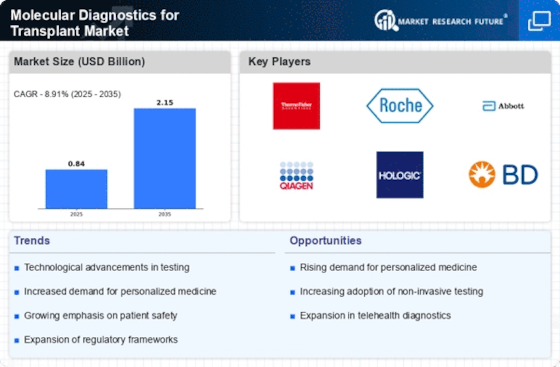Market Trends
Key Emerging Trends in the Molecular Diagnostics for Transplant Market
The rise in infectious diseases is becoming more common due to factors like climate change, fast urbanization, and the evolution of microbes. It's crucial to be extra cautious before performing a transplant because transplant patients are vulnerable to various infections caused by bacteria, viruses, fungi, and parasites. Examples include influenza, urinary tract infections, pneumococcal pneumonia, Cytomegalovirus, Epstein-Barr virus, and Human herpesvirus 6. The growing threat of antimicrobial resistance adds to the concern, with over 2.8 million resistant infections reported annually in the US, according to the CDC. This escalating infectious disease scenario is boosting the demand for comprehensive molecular diagnostics in transplantation. The demand for molecular diagnostics in transplants is fueled by technological advancements. Molecular diagnostics have evolved significantly, transitioning from traditional methods to cutting-edge gene-level diagnostics. This transformation is attributed to advanced technologies like Polymerase Chain Reaction (PCR), molecular diagnostics, Next-Generation Sequencing (NGS), and genetic testing. These technologies are valued for their speed, reliability, user-friendly nature, and the ability to predict predisposed diseases. The progress in NGS technology, in particular, has facilitated diagnostics that study an individual's genetic makeup, influencing their susceptibility to pathogens. Widely applied techniques include Human Antigen Leucocyte (HLA) testing essential for organ transplants and other pharmacogenetic testing. Consequently, these factors contribute to the growing utilization of molecular diagnostics in transplantation, propelling market expansion. The surge in chronic illnesses like heart problems, diabetes, arthritis, and cancer is driving an increased need for transplant procedures. The market is expected to experience growth, particularly due to the rising incidences of cancer and cardiovascular diseases. Unhealthy lifestyle choices, such as excessive tobacco and alcohol consumption, contribute significantly to health issues and are major contributors to organ failures. Chronic conditions like heart disease, stroke, cancer, respiratory disease, and the ongoing impact of COVID-19 collectively impose a substantial global health burden. According to the Center for Disease Control (CDC) in 2019, six out of ten adults grapple with chronic diseases, and four out of ten individuals deal with more than two chronic conditions. The prevalence of various cancer types, including lung, blood, breast, and liver cancers, is on the rise globally. This increasing prevalence underscores the growing demand for transplant procedures as a viable solution to address the complex health challenges posed by these chronic diseases.



















Leave a Comment